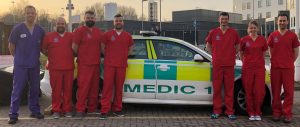Template File: /www/wp-content/themes/stn2017/index.php | Template Hierarchy
WP version: 6.7.2
PHP version 8.2.28
Introduction by National Clinical Lead
Annual report time arrives once again, and in this new style of presentation my superlatives for the work of all who support the continued work, development and improvements of the Scottish Trauma Network will be brief. This is just as well, as the resources of my thesaurus begin to abate.
It is now 5 years since we convened and commenced our program of work to build and implement an entirely new clinical network of acute care and long-term rehabilitation for Scotland’s most seriously injured. August 30th 2021 witnessed the completion of Phase I with delivery of the fully operational end product. At time of writing, we run smoothly and successfully in the best traditions of “National Collaborative Pragmatism”.
All of this achieved of course, against the backdrop of complications presented to us by the pandemic. A remarkable achievement now recognised and acclaimed at the highest levels of the NHS, the Scottish Government, and national and international media.
This hard-earned and well-deserved reputation requires stiffening of the sinews and strengthening of resolve to be maintained, for us to progress further as we contribute well beyond our remit to the Remobilisation of the NHS in Scotland.
Thus, now begins Phase II, where we plan to tell the story using data, to raise standards for the future, and to demonstrate the sustained improved outcomes for patients, their families, their communities and the nation as a return on the visionary investment of these past 5 years.
The full report can be seen here
Martin McKechnie
National Clinical Lead
Scottish Trauma Network
In April 2022 the ScotSTAR Emergency Medical Retrieval Service (EMRS) North team marked 3 years of operations. EMRS North is part of the Scottish Ambulance Service (SAS) and is funded through the Scottish Trauma Network (STN). Operating from the Aberdeen Airport ScotSTAR North base the duty team comprises of a retrieval consultant and a retrieval practitioner / clinical fellow.
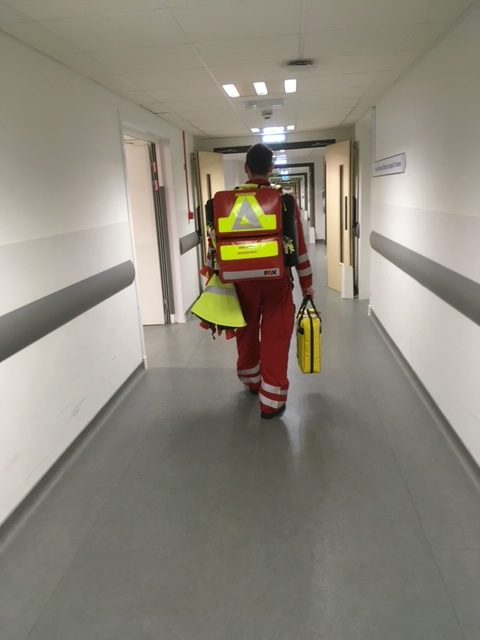
EMRS North consultants come from an anaesthetic, emergency medicine or intensive care medicine background. Consultants spend time working for EMRS and time working in their base hospitals. At present we have consultants from NHS Grampian, NHS Tayside and NHS Highland. The retrieval practitioners all come from a paramedic or nursing background and work full-time for EMRS. The clinical fellow posts have proved extremely popular and allow anaesthetic, emergency medicine or intensive care medicine specialty trainees to join the team for 6 months and develop skills in pre-hospital and retrieval medicine.
The EMRS North has 3 main roles-
EMRS North predominantly cover the North of Scotland but all procedures, equipment and tasking are the same as EMRS West which has two duty teams available 24/7. Practically this means at any one time there are 3 EMRS teams providing national cover spilt between the bases in Glasgow and Aberdeen. This cross cover has seen EMRS North attend taskings across Scotland from Shetland to the Scottish Borders and provides resilience.
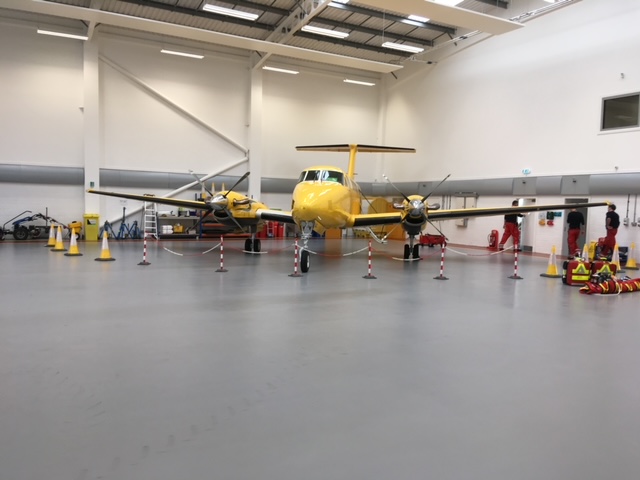
The workload is not exclusively trauma and is a good example of how the STN has wide reaching benefits especially in the care of critically ill patients.
In April 2020 Scotland’s Charity Air Ambulance launched their Aberdeen based aircraft Helimed 79. The Helimed 79 base is adjacent to the ScotSTAR North base and the teams work closely together. EMRS North and Helimed 79 brief and train together daily; when requested by the Trauma Desk EMRS North will accompany the Helimed 79 team allowing “red” interventions to be delivered faster and across a greater area.
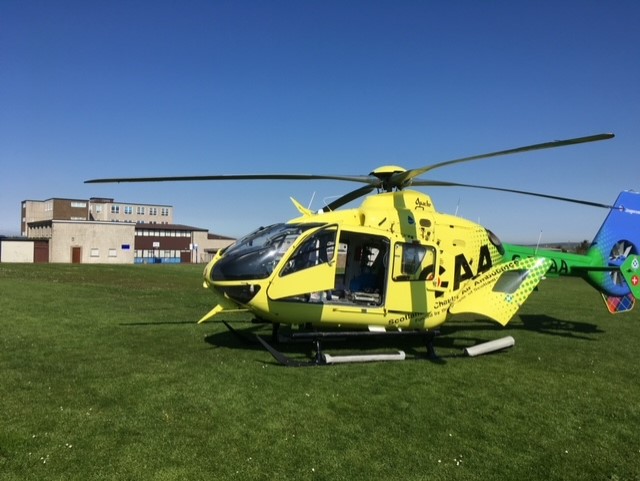
The first 3 years of EMRS North operations have seen-
Primary taskings typically take around 2.5 hours from a
ctivation to being back on base while secondary transfers take a bit longer with an average duration of 7.5 hours. EMRS North have responded to one major incident and assisted with cross-cover while other major incidents ongoing.
2021 saw the teamwork with Firecrest Films as part of the filming for the Channel 4 series “Rescue: Extreme Medics”. Episode 2 features the EMRS North duty team who attended a plane crash – check it out on All 4 (Channel 4 on demand).
Looking forward the team are expecting a busy summer with international tourists returning and rural populations increasing over the holiday periods. The team are also looking forward to getting out on more liaison visits to referring sites and local ambulance stations.
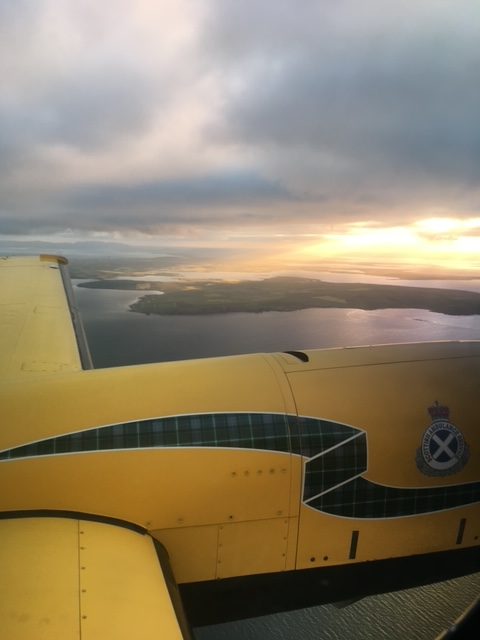
The eighth report by the Scottish Trauma Audit Group (STAG) since 2011 can be found on the Public Health Scotland website. Compliance with a subset of the Scottish Trauma Network Key Performance Indicators, case-mix adjusted mortality and Patient Reported Outcome Measures (PROMs) are within part one of the report. Part two and three provide a comprehensive summary of injuries and the patient journey for both adults and paediatrics respectively.
Introduction from National Clinical Lead
2020 – 21 has been variously difficult, challenging, interesting and rewarding across the many spheres of activity, development and progress for the Scottish Trauma Network (STN). This Annual Report sits alongside and complements the imminent publication of the Scottish Trauma Audit Group’s (STAG) Annual Report for the same period. They both reveal and explore much of the data, operational and patient-centred clinical stories around this past year’s extraordinary activity within the Network. Set against the pandemic backdrop, the strong message coming from these reports is one of resilience, maintained high-quality patient care and an above-and-beyond spirit of collaboration and pragmatism on a national scale. That key performance and outcome measures have been delivered, yet alone maintained and improved in several areas, is worthy of acknowledgment and appreciation. The reports further explore much of our presentation and discussion at the Scottish Parliament Health and Sport Select Committee in January 2021.
There are many examples to celebrate, but I take this opportunity to highlight and express admiration and gratitude to the Scottish Ambulance Service, the ScotSTAR and EMRS transport and retrieval arms, and the newer Advanced Paramedics in Critical Care red teams therein. Their relentless and complex work in supporting and enabling the pandemic response across trauma and all related critical care services has been inspiring. The STN and patients are thankful to them beyond words. These thanks are expressed in equal measure to all staff and services recruited in good faith and optimism to the STN, yet who found themselves redeployed and reallocated to support the response in other vital areas such as Emergency Departments, Trauma Wards which became Covid High Dependency Units and Critical Care areas, and Theatres.
More interesting still is what much of this tells us about the improved access we now have to data and patient-reported measures. These are the mainstays of why the STN does what it does. With STN Trauma and STAG coordinators now embedded in our hospitals, we are able to reach more broadly across and deeper into the care of trauma patients than ever before. The resulting information and its analysis will further “tell the story” as we move beyond delivery of Phase I later this year, with the opening of the Major Trauma Centres at the Queen Elizabeth University Hospital in Glasgow, and the Royal Infirmary of Edinburgh, and the operational delivery of the Regional Networks in the West and South East of Scotland. These final pieces of the jigsaw will complete the national picture alongside the MTCs at Aberdeen Royal Infirmary and Ninewells Hospital in Dundee opened in 2018, supporting all the component services within our Regional Networks.
It is to be hoped that by the time of next year’s report we will be able to reflect upon a time of challenge and change with a more secure feel for what the immediate and medium-term future holds for our service. This learning allows us to reenergise and reconvene with strength, determination and the confidence that comes from surmounting such a significant hurdle.
Every person and every collaborative and linked service involved, described and embraced within the following pages is deserving of the greatest of gratitude and recognition. We are indebted to you all.
The full report can be seen here.
Martin McKechnie
National Clinical Lead
Scottish Trauma Network
Joel Symonds, Advanced Critical Care Practitioner, tells us about this exciting project.
In November 2018, I was privileged to be accepted as a trainee Advanced Critical Care Practitioner with the Scottish Ambulance Service and Scottish Trauma Network. I’ve worked for the Scottish Ambulance Service since joining as a “Direct Entrant” in 2006, originally at Edinburgh North Station. Since then, I’ve worked as a 3RU Paramedic, A&E Team Leader and Specialist Paramedic, while also working with Edinburgh Royal Infirmary’s EMERGE Research Group. As soon as I heard about the development of the Advanced Practitioner role, I knew I wanted to be involved; the role is such a great mix of enhanced clinical skills and knowledge with enormous opportunities for teaching, learning, research, publication and clinical leadership. Staffed by individuals from paramedic and nursing backgrounds, the team is truly multi-disciplinary with many team members bringing knowledge, abilities and experience to the table that far exceed the typical skill sets of their registered titles.
While Advanced Critical Care Practitioners have been practicing within hospital for many years, our role has a truly unique element, delivering both pre and in-hospital care and acting as a conduit between the two areas of clinical practice in this dual function.
Pre-hospitally, the team delivers “Yellow” enhanced care in the community on a single-crewed, independent basis, supporting ambulance crews at more challenging incidents, or those with the greatest clinical acuity and risk. While currently undergoing an intensive training programme in conjunction with Glasgow Caledonian University, once qualified the team will bring enhanced interventional skills, an expanded formulary and senior clinical decision making to serious incidents around South East Scotland. In addition to this, the role involves being embedded within Edinburgh Royal Infirmary’s Emergency Department, largely working within the Resuscitation, Anaesthetic and High Dependency areas and responding as part of ERI’s Medic One “Red” Trauma Team, working alongside an ED consultant and nurse.
The team have already proven themselves to be valuable additions to the running of the Emergency Department. Dressed in distinctive red scrubs, they occupy a unique space in the team that lies between both nursing and medical staff. In addition to this, their significant exposure to a steady stream of seriously ill and injured patients coming through the door has allowed the ACCPs to greatly increase and develop their patient assessment, clinical decision making and interventional skills, with particular focus on the management of the critically ill, the use of sedation and anaesthetics and the management of major trauma, all of which come further into play when responding with Medic One. The team are especially grateful to all the staff at ERI ED for making them feel so welcome, involved and supported as they establish themselves in this new position.
Crucially, however, there have been significant collaborative, supportive and educational benefits to Scottish Ambulance Service staff who bring patients into the resuscitation department. Handing over a seriously ill patient to a senior Emergency Medicine consultant can be a daunting process for some of our colleagues and many technicians and paramedics now seek out the “red shirt” for debrief, support and learning after more complex cases.
The six members of the team are approaching the end of their first semester of a two year Post Graduate course in Pre-Hospital Critical Care, aligned closely with the learning outcomes and skill sets developed for Advanced Retrieval Practitioners within Glasgow’s EMRS. Next semester’s training will further their emergency surgical capabilities and include training in specialist skills such as blood transfusion, advanced analgesia and care of specific patient groups.
Further discussion, questions and suggestions for collaboration are always welcomed, and any reader keen to find out more about the team and project are encouraged to contact us on scotamb.seapcritcare@nhs.net
